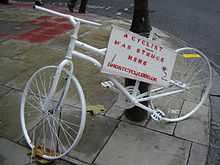Ghost bike

A ghost bike, ghostcycle or WhiteCycle is a bicycle set up as a roadside memorial in a place where a cyclist has been killed or severely injured (usually by a motor vehicle).[1][2] Apart from being a memorial, it is usually intended as a reminder to passing motorists to share the road. Ghost bikes are usually junk bicycles painted white, sometimes with a placard attached, and locked to a suitable object close to the scene of the accident.
History


According to The Guardian, the first recorded ghost bike was in St. Louis, Missouri, in 2003. A witness to a collision between a cyclist and a car placed a painted bike at the location with a message that read: "Cyclist struck here.[3]
The original idea of painting bikes white reportedly goes back to the city of Amsterdam in the 1960s as an anarchist project to liberate two-wheel transport—white bikes were free, help yourself and then leave it for someone else.[4]
The ghost bike idea in the United States may have originated with a project by San Francisco artist Jo Slota, begun in April 2002. This was a purely artistic endeavor.[5] Slota was intrigued by the abandoned bicycles that he found around the city, locked up but stripped of useful parts. He began painting them white, and posted photographs on his website, ghostbike.net.[6] As the idea was taken up for different purposes, Slota faced a dilemma. San Francisco is one of the safer U.S. cities for bicyclists, but memorial ghost bikes sprang up there as elsewhere, changing perceptions of his project.[citation needed]
A ghost bike memorial project was started in St. Louis, Missouri, United States in October 2003.[7] After observing a motorist strike a bicyclist in a bike lane on Holly Hills Boulevard, Patrick Van Der Tuin placed a white-painted bicycle on the spot with a hand-painted sign reading "Cyclist Struck Here". Noticing the effect that this had on motorists in the area, Van Der Tuin then enlisted the help of friends to place 15 more "ghost bikes" in prominent spots in the St. Louis area where cyclists had recently been hit by automobiles.[8] They used damaged bikes, in some cases deliberately damaged to create the desired mangled effect.[9]
Similar projects began in Pittsburgh in 2004,[10] New York City,[11] Seattle in 2005,[12] Albuquerque[13] and Chicago[14] and Toronto[15] in 2006. In August 2005, nearly 40 ghost bikes were placed throughout Seattle to draw awareness to locations of accidents, near-misses, and poor road conditions.[12] A ghost bike in Dupont Circle, Washington, D.C., commemorating a rider killed by a garbage truck in 2008, remained for a full year. When it was removed by city employees, friends of the rider replaced it with 22 ghost bikes, one on every lamppost.[16] London Ghostcycle was active in 2005 and 2006.[17] There have been similar projects in dozens of other cities worldwide.A bike memorial project[18] was recently started Durham, North Carolina to commemorate the death of two prominent cyclist[19] and bicycle safety advocates[20]
See also
References
- ↑ Harper, Tom White 'ghost bikes' pay tribute to dead riders in danger spots across Britain Daily Mail, 1 October 2008
- ↑ Sanders, Jacob Quinn (1 December 2010), "Ghost Bikes: Rough memorials honor cyclists killed while riding", post-gazette, retrieved 1 December 2010
- ↑ Walker, Peter (10 November 2011). "Ghost bikes: memorials to road victims blamed for putting people off cycling". The Guardian. Retrieved 24 November 2011.
- ↑ Furness, Zack (2010). One Less Car: Bicycling and the Politics of Automobility. Philadelphia: Temple University Press. pp. 55–59. ISBN 978-1-59213-613-1.
- ↑ Terry Lowe. "Ghost Bikes". Momentum Planet. Archived from the original on 12 June 2009. Retrieved 23 May 2011.
- ↑ "Jo Slota's website". Ghostbike.net. Retrieved 25 April 2012.
- ↑ Fagan, Mark Friends seek ghost bike memorial for hit-and-run victim Lawrence Journal-World 25 October 2009
- ↑ Roadside displays focus on plight of bicyclists, Greg Jonsson, St. Louis Post-Dispatch, 17 November 2003; re-posted on Missouri Bicycle Federation website, 29 October 2007.
- ↑ Twarowski, Christopher. "Ghostly bikes commemorate fallen cyclists, article at Columbia News Service". Jscms.jrn.columbia.edu. Retrieved 25 April 2012.
- ↑ "Pittsburgh ghost bikes". Pittsburgh.indymedia.org. Retrieved 25 April 2012.
- ↑ "New York Ghost Bikes". Ghostbikes.org. Retrieved 25 April 2012.
- ↑ 12.0 12.1 'Ghost bikes' offer eerie reminder to share the road, Seattle Post-Intelligencer 3 August 2005.
- ↑ Created by gleejb View Groups. "Albuquerque ghost bikes". Dukecityfix.com. Retrieved 25 April 2012.
- ↑ "Elegy for a bike rat". Chicagojournal.com. Retrieved 25 April 2012.
- ↑ "Information Booth: Where did those ghostly white bikes come from?". National Post. Retrieved 25 April 2012.
- ↑ Ashley Halsey III (11 September 2009). "Their Love Cannot Be Unchained: After 'Ghost Bike' Removal, Cyclists' Memorial Effort Intensifies". The Washington Post. Retrieved 11 September 2009.
- ↑ "London Ghost Bikes". Ghostbikes.org. 9 January 2012. Retrieved 25 April 2012.
- ↑ http://www.newsobserver.com/2013/07/13/3027977/ghost-bike-memorial.html News & Observer Retrieved 14 July 2013
- ↑ http://www.wral.com/pedestrian-killed-in-raleigh-crash/12406954/
- ↑ http://www.wral.com/bicyclist-killed-in-durham-hit-and-run/12639104/ Retrieved 13 July,2013
External links
| Wikimedia Commons has media related to Ghost bicycles. |
- Information on ghost bikes around the world: Ghost Bikes and Ghost Bike, a project by Jo Slota.
- Information on ghost bikes in New Zealand: Ghost Bikes New Zealand
- Chicago's Ghost Bikes: photos and map